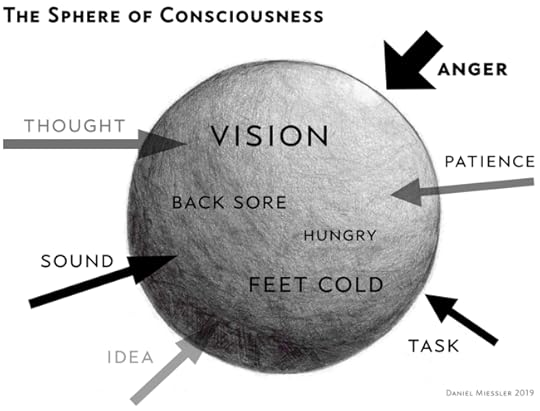A Beginner’s Notes on Meditation

I’ve wanted to get into meditation since I was in my late teens, but it just never materialized. Everything I did learn seemed too ephemeral and distant, and I lacked the time to go deep enough to get past that.
I’ve tried multiple meditation apps and Sam’s is my clear favorite.
This has finally changed with the benefits of technology—namely podcasts and meditation apps. I am particularly fond of Sam Harris’ Waking Up app (and book of the same name), and it was his consistent exposure to the practice that finally pushed me through.
I am not an expert in mediation, and in fact I’m not even a decent novice. But I already feel as if I’ve learned enough to capture, so I’ll dedicate this page to what I learn—keeping in mind that I may get it all wrong early on (or perpetually).
Stoicism also teaches us to separate the input from our reaction to it.
I happen to also be studying Stoicism right now, and I find the similarities between its teachings and of Vipassana meditation to be significant and extraordinary. So I’ll be talking about that as well.
The format will be me teaching myself, all the while knowing that I may need to change it as I learn more. I hope my floundering is useful to someone.
1. You are not your inputs, and everything you experience is an input
I think this might end up being the most important and powerful concept in all of meditation. It’s the idea that every single thing streaming into your consciousness is separate from you.
Sights, sounds, pain, pleasure, thoughts, ideas, emotions, desires, etc—they’re all inputs into a very specific place called consciousness.
It seems the entire enterprise is based on this realization.
2. At any given time, you are either aware of inputs, or you are merged with your inputs
Modern CBT actually has its roots in Stoicism.
Building on #1, the second thing you have to realize is that a lack of awareness of this distinction can cause you to become those various inputs. This is very similar to what the Stoics talk about (and modern-day therapists as well) when they say there’s a huge difference between what happens to you, and how you choose to react to it.
If we fail to notice an input, and label it as such, it strikes us from the side and takes control. Only when we face it head-on can we remove its power over us, which we do through awareness.
Once you realize that thoughts, emotions, and sensory inputs are all equal in that they’re external invaders of consciousness—you realize that the problem is actually distraction.
Distraction is the default state that makes us believe we are the same as our inputs. It’s how we all live our lives. And distraction is what allows us to be hijacked by inputs.
In astronomy if you want to see something dim you have to look away from its center.
If your ankle really hurts, and you don’t view that pain as an input to consciousness, you will become that pain.
If you just gave a really bad presentation, and you don’t view your regret as an incoming and external input to consciousness, you will become that regret.
And if you are lost in thought—not realizing that random thoughts are just additional inputs into consciousness—then you will become those thoughts.
In short, the state of being distracted by life is what allows you to be hijacked by various thoughts, feelings, and emotions.
And mindfulness is simply flipping the switch from distraction to attention, which lets you see all of life’s stimuli as equal inputs into consciousness.
Observations, Notes, and Questions

Here I’ll be capturing my questions and observations as I learn more about meditation and related topics. If I make any major discoveries—or observations that I think to be a discovery—I’ll update the section above. Everything else will just be captured questions and note-taking.
Nov 16, 2019 — What about focus? Isn’t that a good thing to go into a flow state, or “the zone” when working on something? Programming, for example, is extremely pleasurable when you get into a phase of pure creation. It’s almost like Transcendental Meditation—which is not as good as Vipassana—but is still better than being distracted by multiple things at once. Is this also something to abandon? I don’t think so, but I’m open to ideas.
Nov 16, 2019 — I’m confused about what the self actually is if we accept that the sphere of consciousness is not us. Is that correct? Sam talks about “the illusion of self” so perhaps he’s saying there’s literally no self at all. I wouldn’t mind that for the same reason that I don’t mind that free will is an illusion, but I do need to reconcile the difference between the perceived self, i.e., the practical self, and the self that disappears once you reduce reality to the Sphere of Consciousness. My problem is that I’m always trying to upgrade myself. I’m studying for a reason. I’m reading for a reason. I am trying to improve my own condition so that I can improve the condition of others. Those all require that there is a thing that’s being upgraded—at least conceptually. So I need to explore that and lock it in conceptually in my mind.
—
If you like my content, you can support it directly for less than a latte a month ($50/year) which also gets you the Unsupervised Learning podcast and newsletter every week instead of just twice a month.
Daniel Miessler's Blog
- Daniel Miessler's profile
- 18 followers



